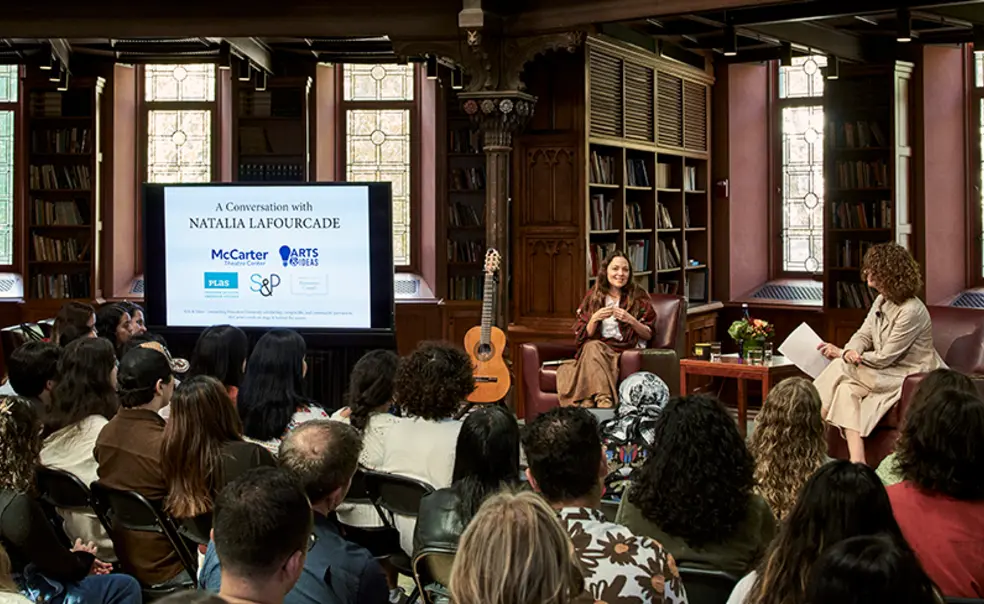The Whole Student: The Arts Can Make Us Less Lonely
A Princeton gem that has been a balm for our campus and in our community is Arts and Ideas at McCarter Theatre
It is not breaking news that loneliness is an epidemic. Divisive politics and the relentless buzz of social media leave us overwhelmed and seeking shelter. We cocoon ourselves out of self-protection, then feel isolated — a truly vicious cycle. When I am not doomscrolling or helping someone else to cope, my heart and soul gravitate toward the arts.
A Princeton gem that has been a balm for our campus and in our community is Arts and Ideas at McCarter Theatre, a series of programs aimed at connecting scholarship, campus life, and community members. It’s co-sponsored by the Princeton Humanities Council. Through these innovative collaborations, McCarter opens its stages and spaces to students, staff, and the local community. Conversations with world-class artists in theater, music, dance, and spoken word draw participants to the arts — and by extension to one another — in real time and space.
“Theatre-infused workshops,” one feature of Arts and Ideas, have welcomed visiting Ukranian scholars, Keller Center entrepreneurs, and Princeton University Press staff. Alumni and current students have improvised outside their comfort zones, together. Community groups have toured costume rooms and sets, green rooms, and performance spaces, and connected with the professionals whose work is to make magic happen. All of this, says Debbie Bisno, director of university and artistic partnerships at the theater, has been as much a joy for the artists as the guests. “It has been a huge point of interest for artists who join us to connect in these intimate, tangible ways with a community of learners who are eager to ask questions and know about the work at a deeper level,” she says.
The impact on well-being is reflected in The Scholar’s Take, a collection of student essays curated by Arts and Ideas. Rachel Glodo, a Ph.D. candidate in musicology who attended “Trailblazing Women of Country” last spring, expressed the joy of finding herself immersed in a cross-generational collective of artistic voices. After a performance by Grammy-winning Mexican singer Natalia Lafourcade, Alex Diaz-Hui, a Ph.D. candidate in Latin American Studies and English, wrote about the “visceral connection between the audience and the performance... a closeness in the same way I might perform in my friend’s living room.” Diaz-Hui remembers only “the way the music felt in my body,” and describes the applause at the end as a “thank you for being seen,” – mic drop moments for well-being.
Bisno explains, “These essays demonstrate how engaging with the arts can shift perspective, foster a sense of belonging — and that viewing the world through a creative lens contributes to wellness.”
Jeremy Nobel ’77 has been exploring the link between the creative lens and a sense of well-being for 20 years at The Foundation for Art and Healing, his Boston nonprofit organization. He defines loneliness as the gap between actual and desired social relations and says art can be an antidote because it rewires the brain, allows for the sharing of personal stories, and makes people feel part of something bigger than themselves — all the things that happen in Arts and Ideas.
Nobel’s book, Project Unlonely, and a film series by the same name, offer perspectives on loneliness and creative approaches to mitigating its effects. In the near future, FAH has its sights set on expanding understanding of how the arts can play a role in dying gracefully, conquering stigma around loneliness, and more. Nobel reminds us, “loneliness is really just a signal of a need, as thirst is for water,” and that “habits of creative expression are as important to well-being as diet, exercise, and sleep. Art is a medicine that requires no prescription.”
Programs like Art and Ideas at McCarter provide access to meaningful alternatives to loneliness from which none of us is immune. Alumni such as Nobel are paving the way to greater awareness of how creativity can be harnessed toward healthier, more connected social networks. May we all lean into these options. The whole student, and the whole person we strive to support, will be better off if we do. As the writer Suleika Jaouad ’10 has written, “creating is a way to wrestle back power.” And, I would add, to be less lonely.












No responses yet